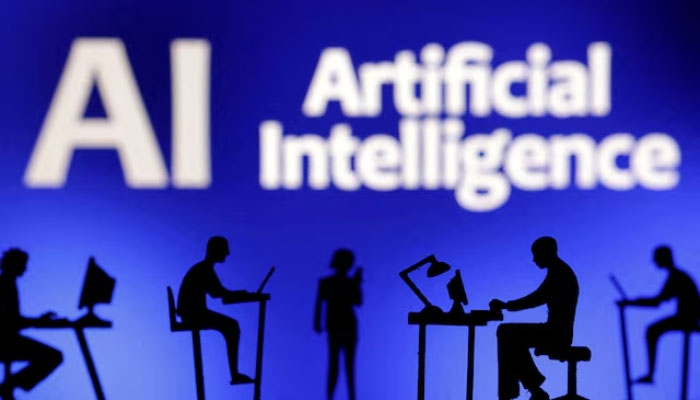AI in court
Delays and backlogs are among most serious problems hindering effective functioning of legal system in Pakistan
In a major ruling on April 11, the Supreme Court called for comprehensive guidelines to govern the use of artificial intelligence (AI) within the country’s judicial framework. This could potentially be a major step forward in Pakistan’s legal development, paving the way for more timely and efficient legal proceedings by enhancing judicial capacity. Already, the Federal Judicial Academy has introduced ‘Judge-GPT’ to assist around 1,500 district judges with case research and drafting under a regulated framework and judges globally have begun using AI in legal research and drafting. Pakistani judges have also experimented with AI tools like ChatGPT for drafting decisions, though under strict human oversight. Delays and backlogs are among the most serious problems hindering the effective functioning of the legal system in Pakistan. According to some reports, the lower and superior judiciaries face a mammoth backlog of over 2 million cases. This not only wastes litigants’ time but results in many not getting any justice at all, with cases remaining unresolved long after those involved have given up hope of their problem being solved. In some cases, litigants pass away with their cases still pending. The case that prompted this ruling was reportedly a rent dispute case that had been lingering on for seven years.
This is no way for a modern judiciary to function and it is hoped that the embrace of AI tools in administrative functions like case allocation, research, drafts can speed up and streamline the legal process. However, despite its potential to help facilitate the judiciary, the apex court affirmed that AI should not become a substitute for human judges or be used in a manner that compromises constitutional fidelity and public trust in the legal system. In short, people should not show up to court to be judged by an algorithm, not least because AI algorithms, regardless of the depth and breadth of the data powering them, are still probabilistic tools that are prone to serious errors. Hence, it is quite reassuring to see that the SC judgment warns against ‘automation bias’ and the potential for AI to generate fabricated or incorrect information and stresses that such tools must never be viewed as conclusive or infallible. As per the UN University, AI models are trained on historical data and predict future outcomes based on past patterns. Predictions, no matter how extensive the data they are based on, are qualitatively different from sound legal judgement and are no basis for determining right and wrong.
That being said, AI tools can still serve as useful fact-finders that help expand legal knowledge. But, whatever output they do generate, has to be verified. Over reliance on past patterns also carries the risk of generating biased and/or discriminatory outputs, reinforcing existing inequalities. According to some experts, AI can also reflect the assumptions or preferences of the developers coding them. We will need to not only ensure that AI does not become a substitute for human judges and core legal principles but also come up with better and less biased AI tools and platforms suited for a judicial environment. For now, one can hope for a legal system that allows judges to get their work done faster.
-
 Eric Dane Says Touching Goodbye To Daughters Billie And Georgia In New Netflix Documentary
Eric Dane Says Touching Goodbye To Daughters Billie And Georgia In New Netflix Documentary -
 Channing Tatum Reveals What He Told Daughter After Violent Incident At School
Channing Tatum Reveals What He Told Daughter After Violent Incident At School -
 King Charles Lands In The Line Of Fire Because Of Andrew Mountbatten-Windsor
King Charles Lands In The Line Of Fire Because Of Andrew Mountbatten-Windsor -
 Denise Richards Doubles Down On Abuse Claims Against Ex Husband Aaron Phypers Amid Show Return
Denise Richards Doubles Down On Abuse Claims Against Ex Husband Aaron Phypers Amid Show Return -
 Russia Set To Block Overseas Crypto Exchanges In Sweeping Crackdown
Russia Set To Block Overseas Crypto Exchanges In Sweeping Crackdown -
 Gwyneth Paltrow Reveals Deep Personal Connection With Kate Hudson
Gwyneth Paltrow Reveals Deep Personal Connection With Kate Hudson -
 Prince Harry, Meghan Markle’s Game Plan For Beatrice, Eugenie: ‘Extra Popcorn For This Disaster’
Prince Harry, Meghan Markle’s Game Plan For Beatrice, Eugenie: ‘Extra Popcorn For This Disaster’ -
 OpenAI To Rollout AI Powered Smart Speakers By 2027
OpenAI To Rollout AI Powered Smart Speakers By 2027 -
 Is Dakota Johnsons Dating Younger Pop Star After Breakup With Coldplay Frontman Chris Martin?
Is Dakota Johnsons Dating Younger Pop Star After Breakup With Coldplay Frontman Chris Martin? -
 Hilary Duff Tears Up Talking About Estranged Sister Haylie Duff
Hilary Duff Tears Up Talking About Estranged Sister Haylie Duff -
 US Supreme Court Strikes Down Trump’s Global Tariffs As 'unlawful'
US Supreme Court Strikes Down Trump’s Global Tariffs As 'unlawful' -
 Kelly Clarkson Explains Decision To Quit 'The Kelly Clarkson Show'
Kelly Clarkson Explains Decision To Quit 'The Kelly Clarkson Show' -
 Inside Hilary Duff's Supportive Marriage With Husband Matthew Koma Amid New Album Release
Inside Hilary Duff's Supportive Marriage With Husband Matthew Koma Amid New Album Release -
 Daniel Radcliffe Admits To Being Self Conscious While Filming 'Harry Potter' In Late Teens
Daniel Radcliffe Admits To Being Self Conscious While Filming 'Harry Potter' In Late Teens -
 Director Beth De Araujo Alludes To Andrew's Arrest During Child Trauma Talk
Director Beth De Araujo Alludes To Andrew's Arrest During Child Trauma Talk -
 Video Of Andrew 'consoling' Eugenie Resurfaces After Release From Police Custody
Video Of Andrew 'consoling' Eugenie Resurfaces After Release From Police Custody




